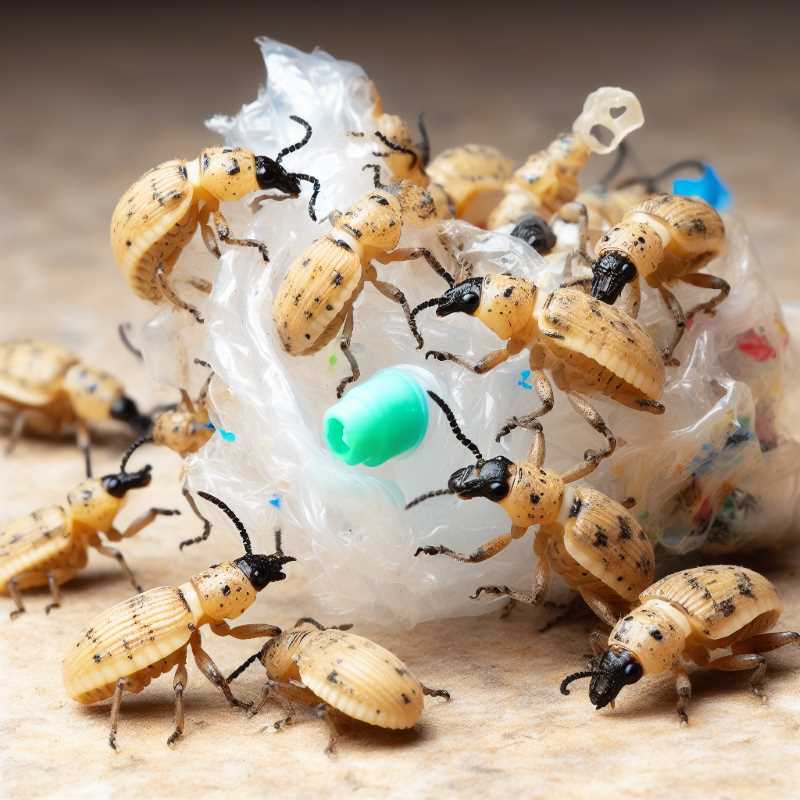How Weevils Are Redefining Plastic Waste Management
Researchers utilize weevils to fast-track plastic bag biodegradability tests. The novel technique, efficient and cost-effective, analyzes weevil feces to determine biodegradability, compostability, and toxic elements. The unexpected bonus: weevil-produced humus benefits plant growth.

In the quest for sustainable solutions to the ever-growing plastic pollution crisis, researchers at the Engineering Institute (II) of the National Autonomous University of Mexico (UNAM) have turned to an unexpected ally: weevils. These tiny beetles, traditionally considered pests for their penchant for feeding on seeds, have now become instrumental in examining the biodegradability of plastic bags.
Led by researcher Neftalí Rojas Valencia, the team at UNAM's Engineering Institute has developed a groundbreaking, fast, and cost-effective technique to analyze the biodegradability or compostability of plastic products in the market. What sets this method apart is its simplicity—it requires no specialized equipment, personnel, or reagents.
Rojas Valencia's inspiration for this unique approach came from reports suggesting that weevil larvae could potentially degrade bags made from hydrocarbons. Since 2018, the team has been researching and has yielded surprising results: the larvae consume plastic bags without the need for any additional components.
“In the laboratory, we have observed how they consume the bags, passing them through their digestive tract and digesting them to benefit from their components,” Rojas Valencia explained. “They take advantage of carbon, generating the energy required for their metabolism. It's fascinating how they excrete what is of no use to them, mirroring the natural processes of any living being.”
The researchers have not only confirmed the weevils' ability to break down plastic but have also analyzed the resulting feces to evaluate changes in the composition of biodegradable and compostable bags. This innovative technique allows for a single test to determine crucial parameters, such as biodegradability, compostability, and the presence of toxic elements.
Rojas Valencia emphasized that the conventional standards for evaluating plastic bags can be time-consuming for manufacturers. With her technique, results are obtained in just eight days, significantly reducing the waiting time for compliance assessment.
The research has broader implications beyond waste degradation. The weevil feces, enriched with micronutrients, have proven beneficial for the growth of various plants, including grass, barley, tomato, and radish seeds. This unexpected bonus highlights the potential of this approach in promoting a circular economy.
While Rojas Valencia experimented with worms as well, she found that weevils presented a more efficient and straightforward process. Worms required grinding and mixing with organic waste, making the process less practical and harder to assess for potential dangers.
The technique developed at UNAM's Engineering Institute has already garnered recognition, with a patent application pending at the Mexican Institute of Industrial Property. The project secured the third place in the UNAM Program for the Promotion of Patenting and Innovation, providing crucial financial support for further studies and scientific exploration.
Rojas Valencia and her team are now delving deeper into the microbial aspects of weevil digestion, aiming to understand the bacteria and enzymes involved in the degradation process. Their ultimate goal is to create plastic with optimal components, and they have already scrutinized over 50 types of bags in pursuit of this objective.
In conclusion, this innovative use of weevils showcases the potential for nature-inspired solutions in tackling environmental challenges. As the global community grapples with the plastic waste crisis, such inventive approaches offer hope for a sustainable and eco-friendly future. The study not only sheds light on a novel method for plastic waste management but also urges consumers to consider alternatives and reduce their reliance on conventional plastic bags. After all, the best waste is the one that is not generated in the first place.




